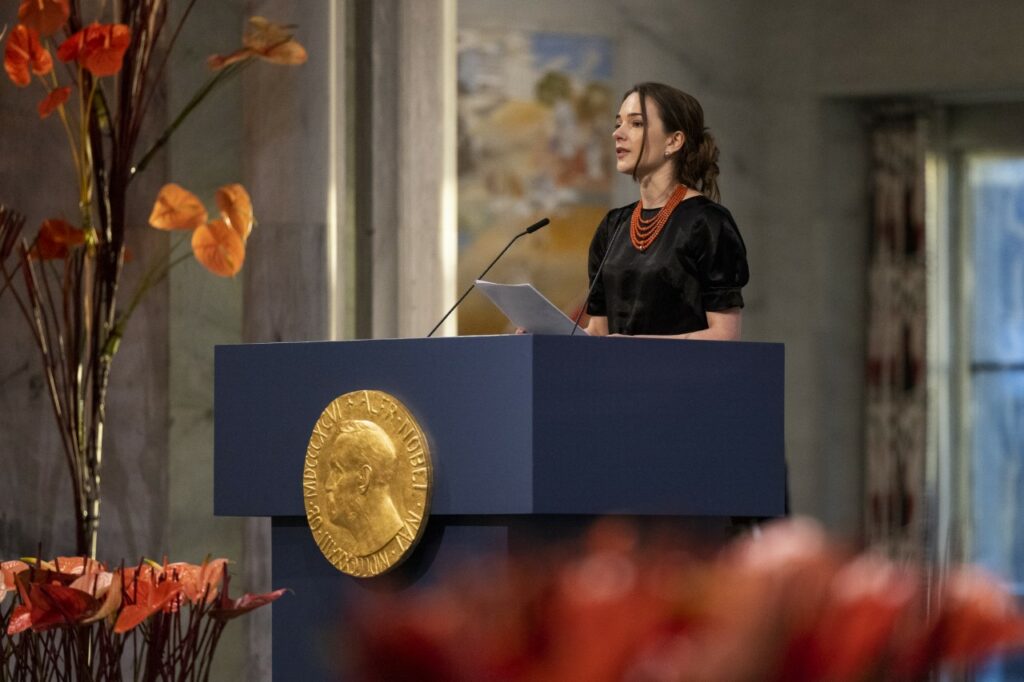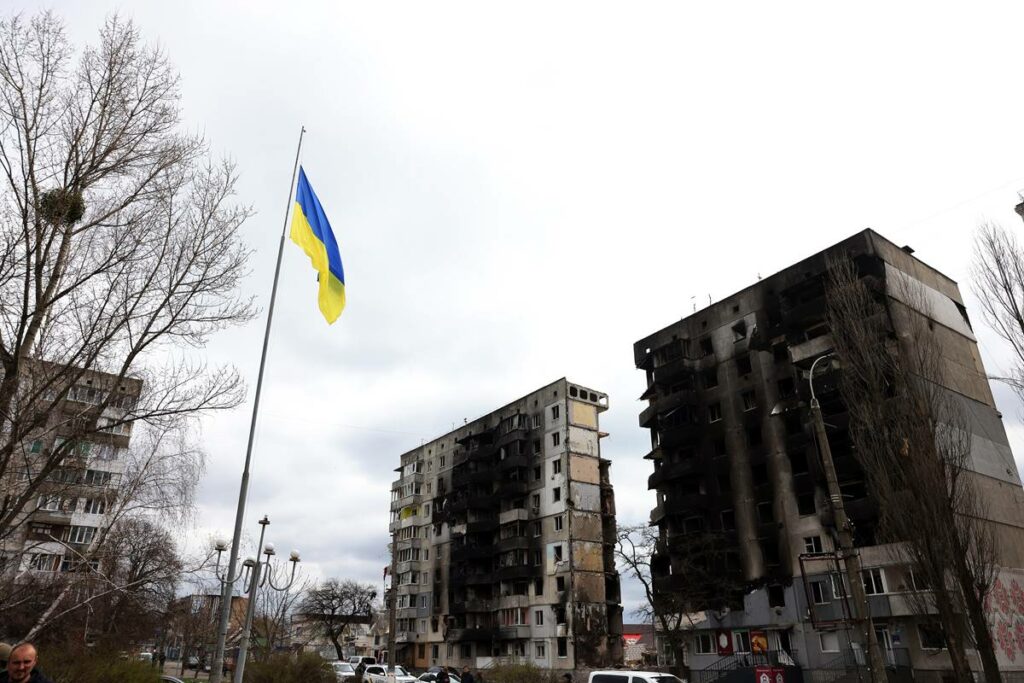The European Commission announced last weekend the formal establishment of a new International Centre for the Prosecution of the Crime of Aggression against Ukraine as a first step towards a special tribunal.
“Russia must be held accountable for (its) horrific crime,” said Commission president Ursula von der Leyen in a statement. “Putin must be held accountable. We must do everything in our power to bring the perpetrators to justice. The EU is supportive of the role of the International Criminal Court. We also believe that there needs to be a dedicated tribunal to prosecute Russia's crime of aggression.”
The decision on the new Centre (ICPA) was taken at the ‘United for Justice’ Conference in Lviv. The Centre will be located in the Hague, The Netherlands, next to the International Criminal Court, and will preserve evidence and prepare the prosecution for future trials to ensure accountability for Russia’s crimes in Ukraine.
But the Centre will not become operational at once, according to a Commission spokesperson on Monday. To start with, the ‘building blocks’ for the Centre will have to be prepared. This is a process which might take some months. In the meantime, the Commission is working with the ICC and its international partners in joint investigation teams.
As previously reported, the Commission announced already in April last year a number of measures to support independent investigations of war crimes committed against the civilian population in Ukraine. However, the issue of whether the crimes should be prosecuted by the ICC or a dedicated tribunal has not yet been resolved.
The ICC is competent to prosecute the most serious international crimes such as war crimes, crimes against humanity and genocide. Russia is not party to the Rome statute which established the court and does not accept its jurisdiction.
These crimes in Russia’s war against Ukraine should be prosecuted by ICC, the Commission spokesperson told The Brussels Times. As regards the crime of aggression, which is a crime committed by the highest political and military leadership, it is unlikely that it can be prosecuted by the ICC. For this reason, the Centre was established as a first, important step, presumably towards a special tribunal.
The Organization for Security and Co-operation in Europe's Office for Democratic Institutions and Human Rights (OSCE/ODIHR) published already last July an interim report which included initial findings and recommendations connected to violations of laws which may account to war crimes and crimes to humanity, mainly by Russia and to a much more limited extent by Ukraine.
The list of reported violations by Russia was long and included indiscriminate attacks against civilian targets, brutal sieges of cities as a method of warfare, and the use of weapons with wide area effects in densely populated areas. Since then the list of indiscriminate attacks against civilian targets and infrastructure has continued and got worse.
The report did not end by this and reported about sexual violence against women, extrajudicial executions of civilians, unlawful treatment of prisoners of war, suppression of peaceful protests in occupied cities, obstacles to the delivery of humanitarian assistance, and forced deportations of civilians to Russia or the so-called People’s Republic republics in Donbas.
Oleksandra Matviichuk, a well-known lawyer and human rights defender based in Kyiv, told The Brussels Times, that there is already sufficient evidence to start prosecuting Russia for its war crimes in Ukraine. She is the head of the Ukrainian Center for Civil Liberties (CLL), which shared the Nobel Peace Prize in 2022 together with two other laureates.
“In 2014, we started our documenting effort independently. Right now, we have documented more than 34,000 cases since the start of Russia’s invasion on 24 February 2022. We collect all the information, analyze it, identify the patterns, and follow the information to the relevant organisations. Each case is linked to the relevant article in the Rome statute of the ICC.”
The CLL is also working on the creation of a special tribunal. Together with other NGOs, it founded the “Tribunal for Putin” initiative (short for “Breaking the Vicious Circle of Russia’s Impunity for Its War Crimes”).

Oleksandra Matviichuk, head of the Ukrainian Center for Civil Liberties (CLL), giving her Nobel Prize lecture in Oslo, Norway, 10 December 2022, © Jo Straube, NPO
What is the best and legally possible choice for a war tribunal?
Normally war criminals are brought to justice after one side has lost a war and is forced to hand-over them to an international war crimes tribunal. This is what happened after Nazi-Germany was defeated in WWII.
But back then, there were no international conventions against genocide and governments were “free” to commit mass atrocities against their own populations. Only retroactively were crimes against humanity – defined as war crimes committed on a vast scale against civilians – included in the statutes of the Nuremberg trials. The Nuremberg judgment in October 1946 made no mention of genocide.
“With the ongoing war in Ukraine, we see that the international legal system doesn’t work as foreseen,” Oleksandra Matviichuk replied.
“We continue to look at a war tribunal through the prism of the Nuremberg trials when the Nazi war criminals were brought to justice after WWII ended. The crimes in Ukraine are taking place now because the perpetrators aren’t brought to justice. We cannot wait until the war is over. A war tribunal now would have a cooling effect on Russia and show that there is no immunity for war crimes.”
“There are thousands of cases. Several of them could be prosecuted by ICC bur far from all. Ohers will be left to the Ukrainian national jurisdiction but it will not be able to handle this enormous scope of work. New instruments should be found or created, for example under the model of a hybrid international tribunal.”
She explained that the Rome Statute of the ICC establishes four core international crimes: genocide, crimes against humanity, war crimes and the crime of aggression. Some of Russia’s actions have a genocidal element, such as the deportation and re-education of children, and the public declarations on destroying Ukraine as a nation.
The legal problem is that ICC's jurisdiction over the crime of aggression is limited to the State Parties that signed the Rome Statute. Neither Ukraine nor Russia is a party to the Statute.
Only Ukraine has accepted the Court's jurisdiction, so Russian nationals cannot be held responsible for the crime of aggression before the ICC. A way to extend the Court's jurisdiction would be for the UN Security Council to refer the crime of aggression against Ukraine to the Court. However, such a proposal would be vetoed by Russia in the Security Council.
“The crime of aggression is the root of the other crimes,” Oleksandra Matviichuk underlined. “Without the aggression against Ukraine, the other crimes of the Rome Statute would not have been committed and could not continue with impunity.”
She says that a special court for the crime of aggression can be created by an agreement between Ukraine and the United Nations, on the recommendation of the UN General Assembly. “This tribunal would be highly effective because it would be limited to a single crime and target a limited number of political leaders and military commanders.”
Can the new International Centre for the Prosecution of the Crime of Aggression against Ukraine be seen as the embryo of this war tribunal?
“For sure, the establishment of the Centre is an important step forward. Finally, the international community started to hear us. It took a year of full-scale war, photos and stories from Bucha, Mariupol, and Kharkiv, attacks on residential buildings with thousands of civilian casualties, until the world finally saw what is happening.”
Do you see a moral dilemma between holding Russia and Kremlin accountable for the war and ending the war quickly by a cease-fire to be followed by a political solution?
“We don’t think that it’s possible to reach a political solution with Russia because of its imperialist nature. If Putin is not stopped, he will go further, because it’s a war between authoritarianism and democracy. When we talk about justice, there is no moral dilemma. The rights of the victims must be at the heart of all efforts to have justice for them.”
She drew the attention to Russia’s wars in recent years where its army has also committed war crimes as the result of impunity.
“War is terrible, and it is even more terrifying when people get used to it and consider it as something normal. It’s our responsibility to keep reminding the world that the war is still on-going and ravaging our country. The Ukrainian people is in constant danger because it was not lucky with its neighbor. Ukraine fights not only for its independence but also for the European democratic values”
M. Apelblat
The Brussels Times

